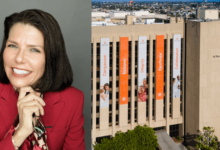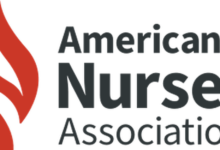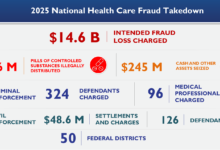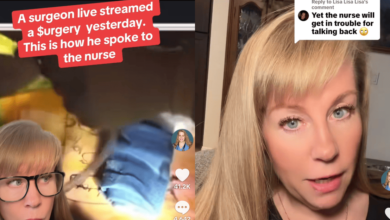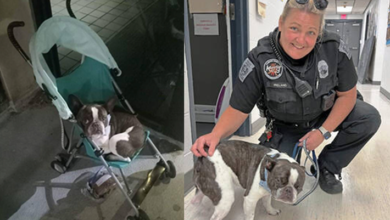Perception of nursing needs boosting, say UK nurse leaders

Some of the leading figures in British nursing have aired their views on the future of nurse training and wellbeing, at an event in Wales.
Welsh chief nursing officer (CNO) Sue Tranka hosted her annual CNO Wales conference last Friday (13 October) in Cardiff. At the event, leading nurses from across the UK, including Ms Tranka herself, spoke about their visions for addressing the biggest problems in nursing.
“We should make sure that those who come in[to nursing], come in with their eyes wide open to what it is”
Alex McMahon
Closing the event was a panel discussion taking questions from the conference audience. Ms Tranka was on the panel alongside England CNO Dame Ruth May, Scotland CNO Professor Alex McMahon and Sam Foster, Nursing and Midwifery Council (NMC) head of professional practice.
The panel was asked for their views on what could be done to improve wellbeing for nurses.
Ms Foster said: “I’ve been at the NMC for six months, having been a chief nurse previously, and I’ll say the same things I’d have said back [in my old job].

Sam Foster
“I think we [need] compassionate [and] good governance. But then I’d pull something else out of compassionate leadership, which is genuinely listening and enabling colleagues to speak up.”
Ms Tranka said, in her view, improving the size and resilience of the workforce was hugely important: “We need to ensure that resilience continues to be built, strengthened and supported.
“You need the right other resources, though, so when you need equipment or training, it’s all there, and the finances to enable you to do what you need to do are there.
“I’d say the second one is around education: continued professional development, postgraduate study availability for career pathways.
“I think all of those are the right things to build.”
On resilience, Ms Tranka said she wanted to change the way the term was understood by the workforce.
“I think you should operate in a resilient system, not expect you to be resilient,” she said.
“So, while I’m trying to build a resilient system for you, we should be able to give you these things.”
The Welsh CNO added that she would like to see an improvement in the psychological support offered to nurses.
Giving her answer, Dame Ruth said: “Kindness above anything right now is something we need to focus on; being kind to each other.

Ruth May
“I’d also say support and looking after each other [is important]. Look out for the person around you that you work with, or works for you.
“And, actually, teamwork is a big one. The thing I’ll take from the pandemic most of all was the flattening of the hierarchies and the teamwork which got us through.”
One member of the audience asked the panel how they thought they could improve the attraction of the profession, and how to retain students as well as newly registered nurses.
The delegate asked: “How do we ensure that education is preparing our [nursing and midwifery] students for what’s quite a different landscape than it was, say, 10 years ago?”
Professor McMahon said that the “tough” nature of nursing and midwifery should not be hidden.

Alex McMahon
“It’s really tough and we should not shy away from [that] fact,” he said.
“We should make sure that those who come in, come in with their eyes wide open to what it is, but at the same time, show them that the opportunities are phenomenal.”
The Scottish CNO told the audience that he wanted universities to show the level of seniority that nurses could reach, and tell young people that it was a career path “with no limits”.
He added, however, that this must be matched with a commitment by employers to facilitate this progression.
“Some of the things we’re doing in Scotland recently were around looking at a reduction in the working week to give them that wellbeing, and that support, back,” said Professor McMahon.
“We have also been ensuring that protected learning time as well, because we identified that staff usually don’t get time to learn and develop.”
Ms Tranka said that one thing she wanted to improve was the perception of nursing and midwifery courses as a science.
“When will nursing and midwifery become recognised as a STEM (science, technology, engineering and mathematics) degree?” she asked.
“That’s the bit I think which is going to turn the tide. We may call it STEM, we may walk around saying we are highly analytical, critical thinking practitioners, so why are nursing and midwifery not recognised as STEM degrees and how do we get there?
“It’s a conversation I want to have with the higher education institutions (HEIs), the Council of Deans and others.”
Ms Tranka said that, particularly in some communities, nursing was still not looked upon as a highly skilled and scientific degree.
“In the communities that I come from, when you got two As [at A-level], and you want to get into nursing, you’re told you can use those two As to get into medicine,” she added.
“The pressure in my community will tell me to go into medicine because, of course, there’s the reputation and standing in the community.”
Ms Tranka agreed with Professor McMahon in his suggestion that universities should emphasise the career progression that exists within nursing: “How often do we talk about the benefits of working in our profession and how you can maximise your earning potential?
“We don’t talk about it, we come to nursing first and foremost as the art and the heart; we forget about the science which then brings us the benefits.”

Sue Tranka talking at the CNO Wales summit 2023 in Cardiff
Another audience member, similarly, asked the panel what thought think was the best way to make nursing a more appealing profession, suggesting the possibility of more television advertisements showing it off.
Dame Ruth said: “I’m really proud to be a nurse, and I think we all need to go back to those heady days at the beginning of the pandemic where nurses were proud to say they were a nurse.
“Unfortunately, the TV and the politics all thought nursing was just intensive care nursing, which of course it wasn’t – it was inclusion nurses, there were mental health nurses, family, etc.
“But there was that sense of pride and belonging; in England, we’ve got the television We Are The NHS campaign which has been successful in increasing undergraduate applications.”
She added, perhaps controversially, that coverage of nurses using foodbanks had not helped the perception of the profession and therefore recruitment.
“But the biggest thing we need to stop in our comms […] is: the food bank, the poverty, that discussion that does influence, it really does influence,” Dame Ruth said.
The discussion then turned to international student recruitment. One audience member asked if universities would consider mass recruiting students from abroad to train them domestically.
Ms Tranka said that this exact idea was one she had put forward a few years ago, and which was now coming to fruition; another audience member pointed out that, in North Wales, 52 internationally-recruited student nurses were beginning at one university.
The Wales CNO agreed that this had been, and would continue to be, one way to improve the country’s domestic nursing recruitment pipeline.
She said: “A massive thank you to the universities who have answered that call in Wales.
“It was an initial thought from us, a seed that we sowed a couple of years ago, and now we’ve realised it’s done well, and we’re really looking forward to seeing how their skills are […] given support and [used] in the university.”
More from the CNO Wales conference
